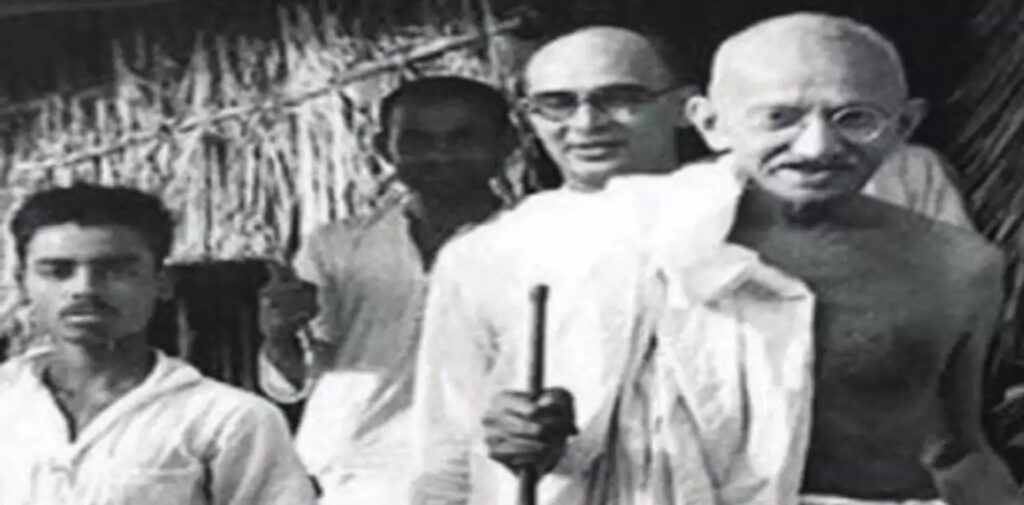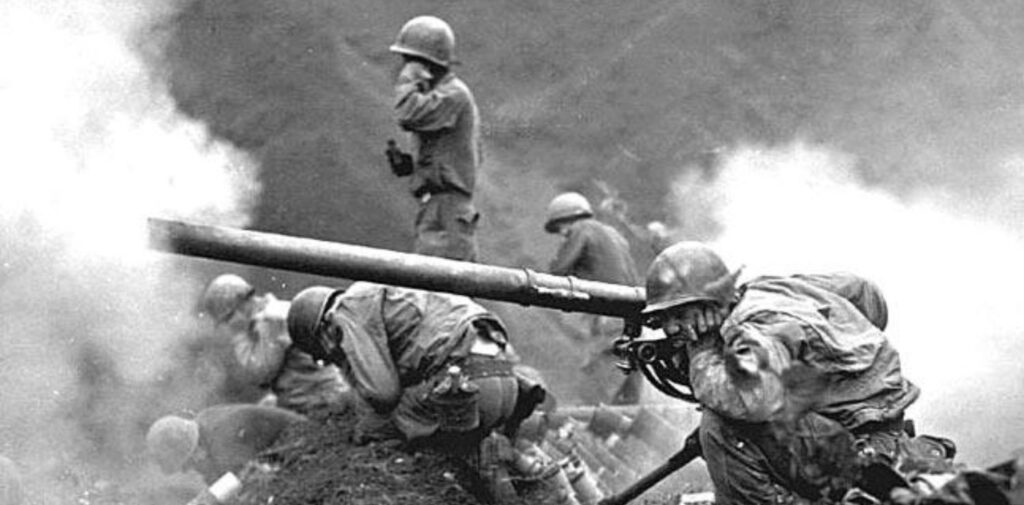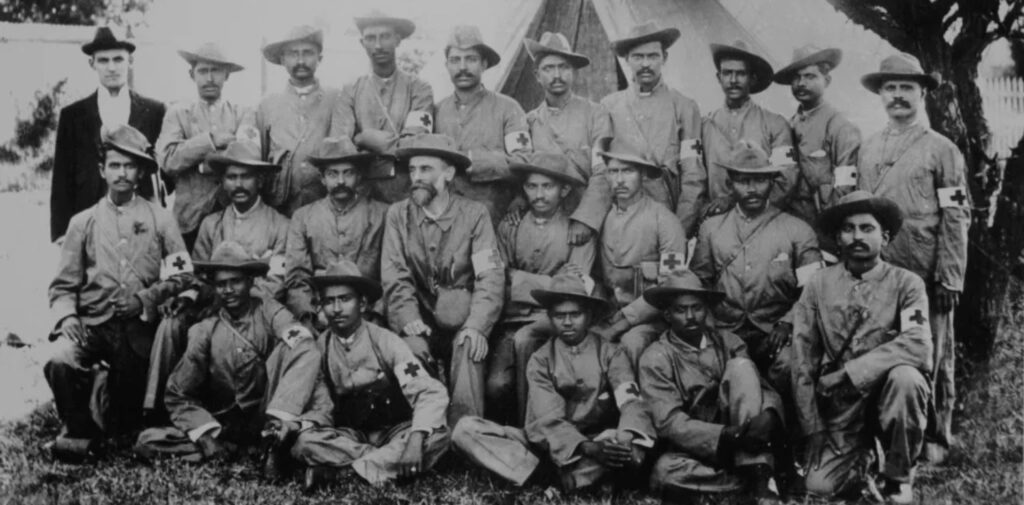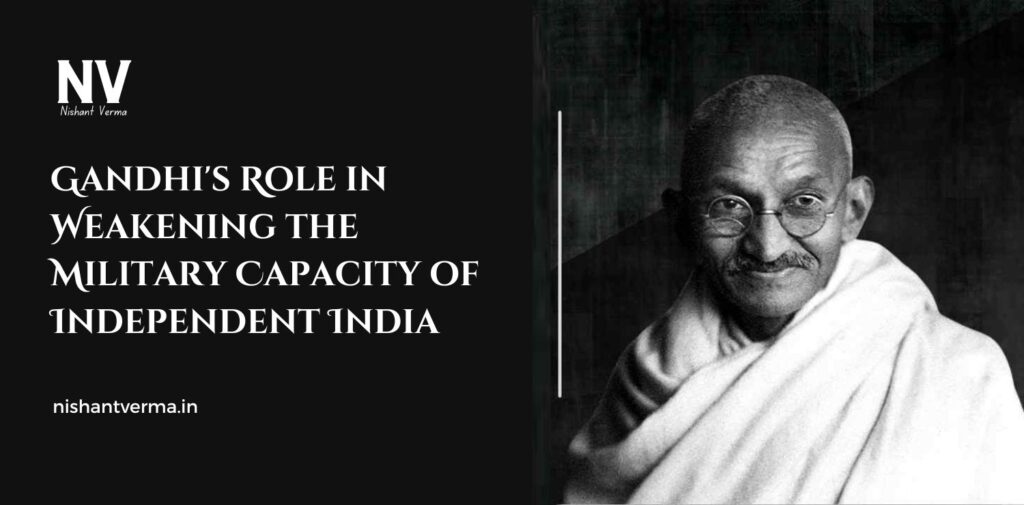When India gained independence in 1947, it emerged as a newly free nation with hopes and dreams of prosperity, peace, and progress. The country faced numerous challenges: it was deeply divided along religious, cultural, and linguistic lines, had to deal with the massive consequences of partition, and was economically and politically fragile. India’s first leaders, including Mahatma Gandhi, sought to build a peaceful, democratic, and non-violent nation. However, Gandhi’s deeply held beliefs in non-violence (Ahimsa) and his commitment to peace ended up having a significant impact on the military capacity of independent India. His reluctance to prioritize a strong defense system and his opposition to militarization weakened India’s military capabilities in its formative years.
Gandhi’s Philosophy of Non-Violence
At the heart of Gandhi’s leadership was his unwavering belief in non-violence. This principle was not just a moral stance but a fundamental way of life for him. Gandhi believed that non-violence could be a powerful tool to confront injustice and oppression, and it was a central pillar of the Indian freedom struggle against British colonial rule. His philosophy of non-violence was also deeply linked to his spiritual beliefs, which emphasized the idea of compassion, understanding, and peaceful resolution of conflicts.
When India gained independence, Gandhi continued to advocate for a peaceful society free from the violence of war. His vision was for India to set an example to the world by showing that a nation could thrive without relying on the power of weapons and military force. Gandhi’s idealism, however, faced a harsh reality in a world where military threats and conflicts were common. This pacifist ideology, while inspirational in many ways, led to the weakening of India’s military capacity post-independence.

Gandhi’s Reluctance to Build a Strong Military
Gandhi’s distrust of military power and his idealistic view of peace led him to downplay the importance of building a strong and modern military for India. After independence, he was convinced that the newly-formed nation could avoid war and conflict by embracing the philosophy of peace and non-violence. He did not see the need for a large, well-equipped military force to safeguard the country’s borders or maintain national security.
Instead of focusing on strengthening India’s defense capabilities, Gandhi advocated for the use of moral authority and peaceful means to resolve conflicts. He believed that India’s strength would lie in its moral values, and that the country could rely on diplomacy and dialogue to maintain peace with its neighbors and within its own borders.
While this vision was admirable in its pursuit of peace, it failed to take into account the practical realities of the political and security environment that India faced. India had numerous challenges, such as a hostile neighbor in Pakistan, the partition of the country, and the threat of foreign aggression. Gandhi’s reluctance to prioritize military readiness left India in a vulnerable position as it faced these challenges in the years following independence.
The Impact on India’s Defense Posture
Gandhi’s approach to national security had long-lasting effects on India’s defense posture. The immediate years after independence saw India’s military forces underfunded and lacking the modern equipment and training necessary to defend the country effectively. Gandhi’s pacifist philosophy led to a reduced emphasis on defense spending, and military development was not prioritized by the newly formed government.
When India’s first Prime Minister, Jawaharlal Nehru, came into power, he too shared Gandhi’s ideals to some extent. Nehru believed in a peaceful, non-aggressive India and was hesitant to build up the military to the levels required to ensure national security. The military’s preparedness was often neglected, and defense policies were slow to adapt to the changing geopolitical realities.
This situation would prove costly for India in the years to come, especially when it faced external threats. The lack of a well-equipped and well-trained military would ultimately expose India to several security challenges, particularly in its relations with Pakistan and China.
The Kashmir Conflict and Military Weakness
One of the most significant examples of Gandhi’s influence on India’s military capacity came during the Kashmir conflict, which began shortly after India’s independence. The princely state of Jammu and Kashmir, located on the northern border of India, was given the option to join either India or Pakistan. The region had a Muslim-majority population, and Pakistan saw Kashmir as an integral part of its territory. However, the ruler of Kashmir, Maharaja Hari Singh, decided to accede to India, leading to a conflict with Pakistan.
When Pakistan launched an invasion into Kashmir in 1947, the Indian military was ill-prepared to respond effectively. India’s defense forces, still recovering from the effects of colonial rule and lacking modern weapons, were stretched thin. Gandhi’s influence in promoting non-violence during the early years of independence had left India’s military ill-equipped to handle such a crisis.
Although Nehru sent military forces to defend Kashmir, the response was initially disorganized. The Indian Army had limited resources, outdated equipment, and struggled to organize an effective defense against the well-armed Pakistani forces. This conflict ended in a ceasefire brokered by the United Nations, and Kashmir was divided along the Line of Control (LoC), with Pakistan controlling part of the territory. However, the military setback revealed how India’s lack of preparedness had harmed its national security, and it highlighted the consequences of Gandhi’s non-violent approach to defense.

The Sino-Indian War of 1962
Another major blow to India’s military readiness was the Sino-Indian War of 1962, which exposed the vulnerabilities of the Indian military. The roots of this conflict lay in the border disputes between India and China, particularly in the areas of Aksai Chin and Arunachal Pradesh. India had never anticipated that China, a neighboring country, would pose a direct military threat.
When China launched a surprise attack on India in 1962, India’s military was caught off guard. The Indian Army was unprepared, poorly equipped, and lacked the necessary infrastructure in the Himalayan region to mount an effective defense. The country’s military forces were still not modernized, and there was little focus on strengthening the defense systems along the northern borders. Nehru’s administration, still influenced by Gandhi’s pacifist ideals, had neglected the urgent need for military preparedness in this region.
The result was a humiliating defeat for India, with China advancing deep into Indian territory before finally declaring a ceasefire. The loss exposed the weaknesses of India’s military and the consequences of not investing in defense and security. After the war, India was forced to make significant changes to its defense policies, but the failure to anticipate the need for a robust military had already caused substantial damage to the country’s security.

Gandhi’s Legacy on Military and Security Policies
Gandhi’s influence on India’s military policies, particularly in the early years of independence, left a lasting legacy on the country’s security landscape. His commitment to non-violence led him to oppose the militarization of the country, believing that peace could be achieved through moral force and international cooperation. However, this approach came at the cost of India’s military preparedness.
While Gandhi’s moral leadership and his advocacy for non-violence were crucial in the fight for independence, the reality of the post-independence world demanded that India also build a strong defense system. Gandhi’s vision of peace, while inspiring, was not enough to shield India from external threats, and his reluctance to prioritize military strength left the country vulnerable during critical moments.
In the aftermath of the 1962 war and other security challenges, India had to reassess its defense policies. The lessons learned from these failures prompted a more serious focus on defense spending, modernization of the armed forces, and strategic alliances. While Gandhi’s ideals of peace and non-violence continue to influence India’s approach to foreign policy, the country has learned the hard way that national security cannot be compromised for the sake of idealism.
Conclusion: Military Capacity of Independent India
Gandhi’s role in weakening the military capacity of independent India is a complex issue. His philosophy of non-violence, while essential in India’s freedom struggle, was not well-suited to the challenges of a newly independent nation facing external threats. Gandhi’s reluctance to prioritize military preparedness and his skepticism towards militarization had a lasting impact on India’s defense posture. The consequences of these policies became evident in the Kashmir conflict and the Sino-Indian War of 1962, both of which exposed India’s military vulnerabilities.
While Gandhi’s ideals continue to inspire millions, the need for a strong and capable military to defend the nation became clear after these setbacks. The challenges India faced in its early years of independence highlighted the importance of balancing idealism with the practical realities of national security. Gandhi’s vision of peace, though noble, must be understood within the broader context of ensuring the safety and sovereignty of the nation.




